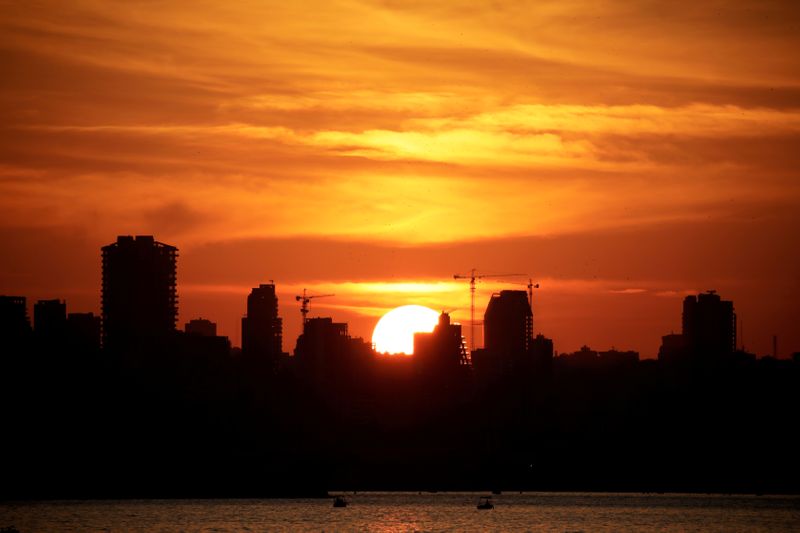By Marc Jones
LONDON (Reuters) - Lebanon has bowed to the inevitable and said it won't be honoring a $1.2 billion bond payment that was due on Monday. It will be its first default, but what options does one of the world's most debt-strained countries now have?
OPTION 1 - THE IMF
Lebanon has been crushed by more than $90 billion of debt, equivalent to roughly 170 percent of the country's gross domestic product, and its prime minister has acknowledged that it has little in the way of useful foreign exchange reserves left.
With the country's economy also on its knees the usual approach would be to ask the International Monetary Fund for support while at the same time trying to broker a deal with the creditors that it has just reneged on.
It had a "technical" visit from the IMF last month which the Fund said was "very informative and productive" but that won't cut it. It needs cash and quickly, otherwise the risk is more violence on the streets as the money begins to run out completely.
The IMF would need to see a credible economic plan but that is hard right now. Beirut is a banking hub and the banks now need recapitalizing and the country's other main revenue earner, tourism, is being hammered by the coronavirus.
The politics are difficult too. Hezbollah, a heavily armed Shi’ite group which is backed by Iran and designated a terrorist organization by Washington, is one of the main backers of the new Lebanon government.
Hezbollah's leaders have been arguing against IMF involvement, saying the likely terms of a bailout would be so painful that they would spark "a popular revolution".
Lebanon doesn't have many bilateral and multilateral loans so even if all those debts were written off it would only reduce the debt burden by 3.5% of GDP according to Capital Economics.
The country's commercial banks hold the bulk of its Lebanese pound-denominated debt and 16% of its foreign currency debt, so a restructuring would risk wiping out their capital.
(GRAPHIC: Who holds Lebanon debt - https://fingfx.thomsonreuters.com/gfx/editorcharts/LEBANON-DEBT-BONDS/0H001R8FGC82/eikon.png)
OPTION 2 - BEG, STEAL AND BORROW
Beirut could try and manage without the IMF but it would still need to do what no previous government has been able to do - slash government spending and start a longer-term program of tax hikes to get the finances back in shape.
Credit rating agency Fitch has said the government may even raid the deposits and savings held in the country's banks like Cyprus did at the height of its crisis, though the government is saying that won't happen.
Either way it would still have to renegotiate the rest of its debts with its international creditors.
Recent defaulters like Ukraine convinced their lenders to write-off some of their money and agree to push back remaining payments and lower interest rates, though that was with the assistance of the IMF.
Lebanon's bonds also lack legal wording known as 'enhanced collective action clauses', meaning its bonds might need to be renegotiated almost one at a time rather than in one or two big hits as other countries might do.
And if any bond holder or group of bond holders with 25% or more of a bond doesn't like the terms the government is offering they could potentially block the whole process.
As Lebanon's economy minister Raoul Nehme explained, "we are proposing to them (bondholders) to work hand-in-hand to find a solution, which is always better than litigation. But it is their choice to decide whether to cooperate."
(GRAPHIC: Hot spring for Lebanon - https://fingfx.thomsonreuters.com/gfx/editorcharts/LEBANON-DEBT/0H001QXWPBFZ/eikon.png)
OPTION 3 - THE ARGENTINA ROUTE
The final option would be to try and strongarm any resistant bond holders into a deal by effectively locking their money in the country, but it would come with extreme risk.
Sovereign debt lawyers warn it could end up like Argentina. A litigious group of funds took the country's government to a New York court when it refused to pay. That court effectively banned international banks from buying any new Argentina bonds while the case went on and Argentina found itself locked out of international debt markets for the best part of a decade.
If it does end up in a legal battle the funds involved might make claims for the country's remaining assets which could include anything from government-owned property to state-owned firms or infrastructure.
"I just cannot see how they can offer any sensible debt reduction plan," said Aberdeen Standard Investments' portfolio manager Viktor Szabo. "If it ends up as a legal battle it could be worse than Argentina.
